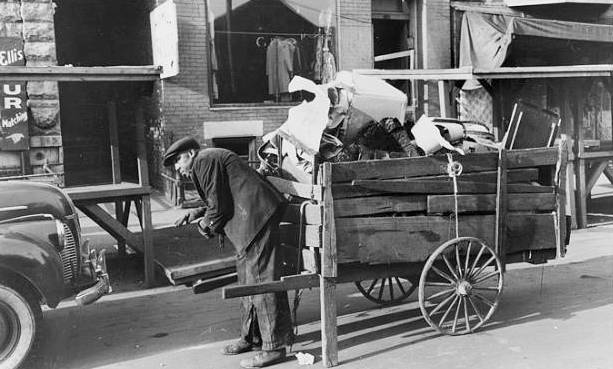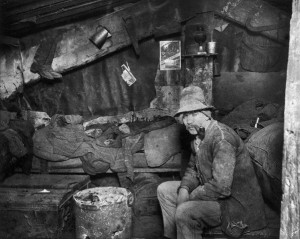Horse and cow bones were scattered all over Brooklyn in the 1870s. In its July 21, 1877 edition, the Brooklyn Daily Eagle used its customary sensitivity in a profile of one bone collector who made his living from such refuse. An excerpt:
“A seedy looking German, with tangled hair and beard, propelled a small handcart slowly up Flatbush avenue on Thursday. At his sides were three large dogs of mongrel breed. When near the corner of Dean street the man spoke to the dogs, and they immediately quitted his side and began running through the gutters of the neighborhood streets. Soon one of the dogs returned with a large bone in his mouth, and this he deposited at the feet of his master. The man threw the bone in the cart, also an old shoe that had been brought to him by another dog. It commenced to rain and the man and his dogs sought shelter under a neighborhood shed. An Eagle reporter had his attention attracted to the man, and after considerable trouble engaged him in conversation.
The man gave his name as Herman Groschel, and said he resided in the Sixteenth Ward. Picking up a large bone from his wagon, Groschel said, ‘Bones like that are very best. I can get about a dollar and thirty cents a barrel for them. That is what is called a shank bone, and they are much sought after by bone dust manufacturers. When it is made into dust the bone is sold to sugar refiners. Rib bones are not good for making bone dust to be used in refining sugar; when they are burned they cannot be worked into as fine dust as the shank, head and back bones.’
‘Are the bones of all kinds of animals made into bone dust?’ queried the reporter.
‘Do you find many bones by traveling through the streets with your dogs?’
‘In neighborhoods where there is a large poor population I do very well. Take them wards where there is a large tenement population and a great deal of refuse is thrown into the streets, as the poorer classes very seldom enjoy the luxury of owning ash barrels.’
‘Do you pick up anything else but bones?’
‘Old iron or bottles,’ replied Groschel. ‘I used to do a little in rags, but some years ago I brought home some rags which were infected with smallpox and my girl caught the dreadful disease. Since then I haven’t picked any rags.’
‘What do you do with those old shoes I see in your wagon?’
Groschel smiled. ‘I burn them,’ said he. ‘They do me instead of coal.’
The stench arising from old leather when burning is almost unbearable, yet many of the rag pickers and bone gatherers use no other fuel. Without exception the bone and rag gatherers are either German or Italians. They live cheap, are generally saving, and many of them have accumulated considerable sums of money.”


